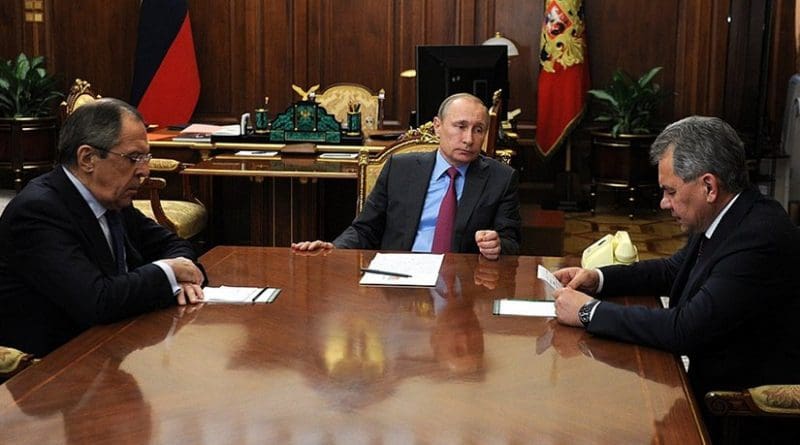Putin’s Political Bombshell – OpEd
By Arab News
By Osama Al Sharif
Russian President Vladimir Putin dropped a political bombshell Monday when he ordered the immediate withdrawal of most of his troops from Syria just as the second round of the so-called Geneva 3 talks between Damascus and the opposition was about to begin.
Until Putin made his unexpected move the mood in Geneva was somber. The two sides had drawn up their red lines ahead of the Geneva meeting. Assad’s Foreign Minister Walid Al-Muallem warned that any discussion of the future of President Assad was a red line. He also rejected calls for a presidential election to be held within 18 months.
The purpose of the meeting in Switzerland, he said, was to discuss the formation of a national unity government; a far cry from the transitional ruling body, with full powers, that the Riyadh-based Supreme Commission for Negotiations wants to be the main point of discussion.
Most observers believed that the mission of UN envoy Staffan de Mistura in the proximity talks was difficult if not impossible. The alternative to peace talks, he said, was going back to war. With no common ground to bring the two sides together, pundits were looking beyond Geneva, mainly if the shaky two-week truce will continue to hold; allowing delivery of humanitarian aid to besieged towns and if Russia will resume its bombing of opposition strongholds to pave the way for regime forces to advance.
But Putin’s surprise move has cast a different mood in Geneva. The US said that it was not tipped about the Russian move. President Barack Obama and Putin discussed the future of the political process after the Kremlin’s decision. Russia said that it had coordinated with the Syrian regime, which in turn said the decision does not indicate a rift between Damascus and Moscow.
Putin said that Russia had achieved nearly all its objectives in Syria, triggering speculations about what these objectives were. But most importantly the move opened discussion about the fate of ongoing talks in Geneva and whether Moscow has now changed its priorities in Syria.
Just as Putin’s surprise decision to intervene militarily in Syria six months ago was a game-changer, the pullout now will change the course of the struggle there. Optimists believe the Russian move will give much needed momentum to de Mistura’s efforts; forcing the regime to take the negotiations more seriously. Certainly, the opposition believes so.
But why has Putin taken such a major decision at this crucial juncture of the Syrian crisis? There are a number of factors to consider. For starters, Moscow’s military intervention in Syria last September has installed it as the key player in one of the most complicated crisis the world has faced in decades. It allowed the Russian strongman to come out of political isolation following his intervention in the Ukraine. As Russia stepped in it also changed the game rules in Syria.
Moscow’s intervention forced a closer US-Russian cooperation on Syria, as evident in the Kerry-Lavrov understandings, which produced the Vienna document and UN Security Council resolution 2254, with a shy reference to the Geneva 1 principles. On the other hand, Russia’s air cover allowed an exhausted regime forces to regroup and recapture important areas in northern, southern and eastern Syria; thus emboldening Assad and his regional allies. This was seen as a main Russian objective in order to create more favorable conditions for a political settlement.
Russia now gets to keep its naval base and a new airbase in Latakia while maintaining leverage over the regime. The decision to withdraw most forces is probably due to worsening economic conditions in Russia, as a result of international sanctions and the drop in oil prices. Putin may have resisted taking such move but was forced to in order to prevent domestic crisis at home. He emerges as a winner, for now, without losing influence over the political process.
This is not good news for the regime. Although Damascus has vowed to continue the war against “terrorist groups,” the current cease-fire lines will remain the same. All eyes are now on Geneva where a new approach to a political solution will gain traction. While the fate of Assad remains a major stumbling block, a compromise of sort will come in the form of an agreement over setting up a transitional governing body.
While the talks will be crucial what is more important is the amount of pressure that both Washington and Moscow will put on their respective allies behind closed doors. In the meantime, some regional players will take a step back to assess the new situation. Turkey will reject any role for the Kurds in the talks, while Iran will ponder the ramifications of Russia’s new role in Syria. The same can be said about the opposition and its backer.
As the Syrian crisis enters its sixth year, there is now a glimmer of hope for a political solution there. It may not please all parties but realistically it presents itself as a last chance for peace.

